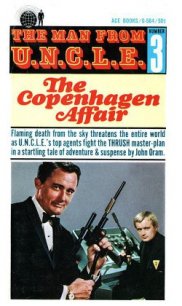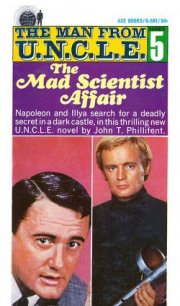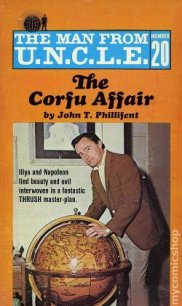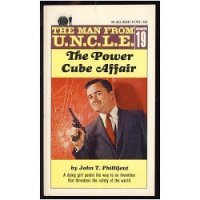The Stone-Cold Dead in the Market Affair - Oram John (версия книг .TXT) 📗
The farmers looked after him and grinned. One of them tapped the front of his head meaningly. Then they got on with their argument.
Feeling as wanted as a two-way stretch in a nunnery Illya went up to bed.
Next morning he was out bright and early, sizing up the terrain and fraternizing with the locals.
Corwen is no metropolis, being just a largish handful of gray Welsh-type houses thrown picturesquely between the mountains and the River Dee. When you've seen the main street, the cattle pen, the open-air market and the bowling greens you've been the rounds. But that was the kind of town Illya liked and he wished he was there with nothing more than a vacation on his mind. He would have enjoyed talking fat-stock prices with the farmers and rambling around the less vertical portions of the scenery.
Around eleven o'clock, while discussing Owen Glendower with a citizen who looked as if he might have been a contemporary, he saw the shock-headed man again. He was still wearing a tweed jacket but it was ancient and bleached by sun and rain. With it he wore battered cord breeches and gumboots that were streaked with dried mud. He walked with a curious forward stoop — almost a lurch. He passed Illya, going fast, his eyes staring angrily ahead. Although he was alone he was talking in a low monotone.
"That one's an oddball," Illya said. "Who is he?"
"Der!" said the ancient. "There's a pity for him. Poor fellow, indeed. It makes my throat dry to think of him."
"I understand," Illya said. He steered the old man into the Cader Idris. The bar, fortunately, was empty. Illya settled him at the far end and bought two pints.
The oldster raised his tankard in a fist like a withered ham. "Davis is the name," he quavered. "David Davis, Pant-y Pwll."
"That guy out there?"
"No, man. Me! I do like to know who I am drinking with, you see."
Illya said, "My name's Carson. I come from Canada."
"Canada, is it? Well, well! I had a brother went to Canada. Time of the Boer War, it was. I ain't never heard from him since." He clucked regretfully.
"The mails are dreadful," Illya said. "But we were talking about the queer fellow in the gumboots."
Davis looked at him under bushy white eyebrows. He pulled out a clay pipe, blew through it, put it between his gums. Then he went through a long pantomime of pocket patting.
"Oh, dammo!" he cackled. "There's an old fool I am, now. Come out without my pouch. And not a bit to my pipe."
Illya sighed and went to the counter again. The bar only carried black shag and he hoped it would poison the old bandit's declining years. He threw the packet on the table.
"Now give," he said.
Davis stuffed the pipe to a running commentary of "t'ck, t'cks' and "dear, dears," but the first swig of beer seemed to lubricate his vocal chords.
"Hugh ap Morgan," he said. "A foreigner like yourself, true — a Cardiff man — but a Welshman of sorts, I suppose, after all. Yes, a sad case indeed."
Illya said, "Let's get this straight. You're talking now about the guy outside, not some relation of yours by marriage?"
"I'm telling you, aren't I? Hugh ap Morgan of Cardiff. Bachelor of Science, University of Wales. Jailbird!" He spat the last word out with vicious relish.
Illya held himself in. The science and jail motif was interesting but it was too early to be optimistic. He asked patiently, "How did he come to get in the can?"
Davis wagged his head slowly. "Misled, he was. Those Welsh nationalists, as they do call themselves! T'ck, t'ck!"
His feelings overcame him. He had to take another drink. That meant more business with the pipe, which he had allowed to go out.
At last he went on: "It was before the war. A big case it was, they tell me, in all the newspapers. Long sentences they all got."
"But for what?"
"I'm telling you, aren't I? Nationalists, they were. Wanting Home Rule for Wales. So they went about burning airports, blowing up bridges and such nonsense. What they call sawbooters."
"And this guy Morgan was one of them?"
"Ay, indeed." He wagged his head again. "Three years he got, because of his youth. And sentence remitted for good conduct, too."
"But that's thirty years ago."
Davis went on as if he hadn't heard. "Of course he was finished. Never got a decent job again, poor dab. Lived hand to mouth, as you might say."
Illya said as casually as he could, "What is he doing now?"
"Oh, he's with the lot up by Cwm Carrog. The ban-the-bomb lot, long hair and no guts." Mr. Davis spat emphatically. "I'd ban-the-bomb 'em if I was ten years younger. And my boy Dai, Welsh Guards, dead out there in France..."
Illya bought him another pint.
"This Cwm Carrog," he said. "What is it?"
"Duw, man! Don't know the Cwm Carrog? There's ignorance for you. A big old farm it is, right up on Berwyn, very ancient. Property of Mr. Price Hughes. A gentleman. Openhandedness, itself."
"And these ban-the-bomb types work the land for him, eh?"
"Ay," he cackled. "Six of them it takes to do the work of two good Welshmen! And nowhere near so well, neither."
Illya said, "The boss is easy to please, it seems."
"Yes, indeed. A very easy man. Mr. Hughes Cwm Carrog. A shame it is the way they do take advantage of him. Loafing about half the day."
"Hmm. I suppose his family has been settled there since the Flood and he's past caring what happens."
Davis shook his head. "No, no. He bought the farm about....let's see now....about six years ago. Came from foreign parts, I'm told. London, I shouldn't wonder. A great traveler, Mr. Price Hughes. That's how they can cheat him, you see. For when he is wanted, there he is — gone again. And not a sight of him for months perhaps."
"Well, if he's so widely traveled he must be wise to these smart guys," Illya said. "Why doesn't he throw them out and work the place with local hands?"
"But why, man?" Mr. Davis leaned close enough to give Illya a strong shot of mixed leek and beer. His rheumy eyes bulged impressively. "Because not a man, woman or child would set foot in Cwm Carrog except in broad daylight. Haunted it is, you wouldn't believe."
Illya ginned. "You're a great old kidder, all right."
If the old man had been a Druid that somebody tried to kiss under the mistletoe he couldn't have been more offended. He put his gnarled hands on the table and slowly hoisted himself to his feet.
"In other places, so I am told, it is different," he said. "But up here there is things we do not make a jest of. I will thank you for your beer and wish you good morning."
He started to walk out of the bar.
"Hey! Wait," Illya called. "You forgot to finish your drink."
Davis hesitated, turned, then stalked back to the table like a flouted patriarch.
"Young you are and ignorant," he said, "but no doubt not meaning to insult. So I will drink your beer though it do stick in my throat like gall." The rest of the pint vanished. "Laugh you do, now, but" — he pointed a threatening finger — "when you have heard the thing that wails and screams all night at Cwm Carrog, and seen the lights where none should be, a different tune you will sing, my boy."
It made a wonderful exit. Illya almost forgot himself and clapped.
After Davis had gone he sat on, thinking. It looked as if he might have struck oil with the first drill. Totting the score he had a screwball nationalist who had done time for sabotage, a mysterious philanthropist who let the hired help loaf around all day, a bunch of possibly phony nuclear disarmers, and a warranted genuine haunted house for them all to play in without fear of local peek-a-booing. And the philanthropist had a record of long absences from the home base.


![[Magazine 1966-12] - The Goliath Affair - Jakes John (чтение книг TXT) 📗](/uploads/posts/books/56867/56867.jpg)

